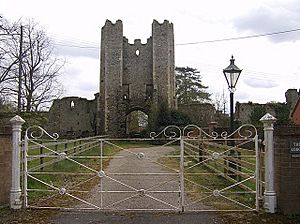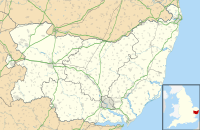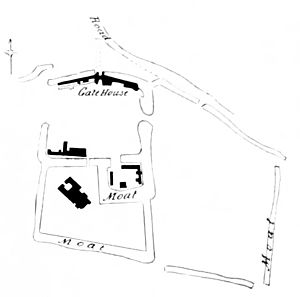Mettingham Castle facts for kids
Quick facts for kids Mettingham Castle |
|
|---|---|
| Mettingham, Suffolk | |

Gatehouse of Mettingham Castle
|
|
| Coordinates | 52°26′41″N 1°28′17″E / 52.4448°N 1.4714°E |
| Type | Fortified manor house |
| Site information | |
| Owner | Private |
| Open to the public |
Yes, on selected days |
| Condition | Ruined |
| Site history | |
| Materials | Stone |
Mettingham Castle was a special kind of fortified home in the English county of Suffolk. It was a manor house built to be strong like a castle. It is located in the small area called Mettingham.
Contents
What Was Mettingham Castle Like?
Mettingham Castle started as a manor house. A manor house was a large country home for a wealthy person. Sir John de Norwich built this house. In 1342, he got special permission to add defenses to his home. This permission was called a "licence to crenellate." It meant he could add things like battlements and strong walls.
How Did the Castle Grow?
The first house had a small moat around it. A moat is a wide ditch, often filled with water, that protects a castle. This moat was about 15 feet wide and had banks 6 feet high. After getting permission, Sir John built another part of the castle to the north. This new area also had its own moat and a gateway. Later, a third moated area was added to the south.
Castle Features
The main entrance to the castle was a strong gatehouse. This gatehouse was built in a style popular during the time of King Edward I. A stone wall also surrounded the entire property, making it even safer. By 1562, the castle had many buildings inside its walls. These included stables for horses, rooms for servants, a kitchen, a place to bake bread, and a place to make beer. There was also a large hall.
Who Lived at Mettingham Castle?
The castle stayed in Sir John de Norwich's family for many years. In 1394, it was given to a group of religious teachers called canons. These canons came from a nearby place called Norton. They started a school at the castle called Mettingham College. Here, they taught up to 13 boys.
What Happened to the Castle Later?
After a big change in England called the dissolution of the monasteries, the college closed. The castle was then sold to different private owners starting in 1542. In the 1700s, much of the castle was taken down. This was done to build a new farmhouse on the site. That farmhouse was also pulled down around 1880. A new house was built using some of the old stone from the medieval castle.
Mettingham Castle Today
Today, Mettingham Castle is a very important historical site. It is protected as a scheduled monument and a listed building. This means it is recognized for its historical value. The old gatehouse is still standing. You can also see parts of the original stone walls. Many of the moats and earthworks (changes made to the land) are still there too. In recent years, a big project helped fix damage to the castle. English Heritage gave a lot of money to help with these repairs.
 | Tommie Smith |
 | Simone Manuel |
 | Shani Davis |
 | Simone Biles |
 | Alice Coachman |



